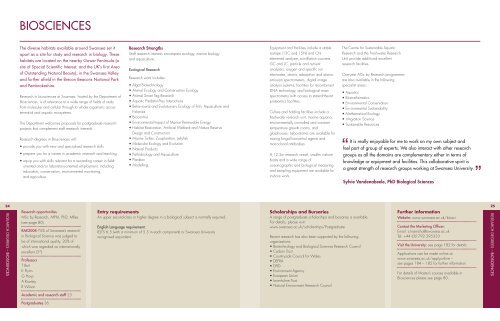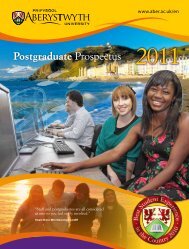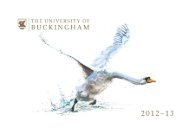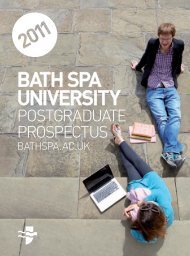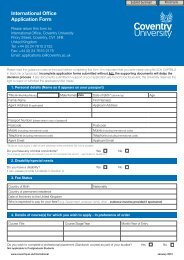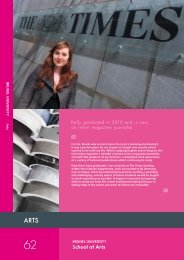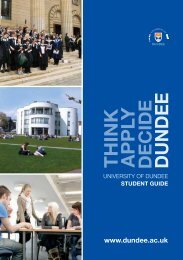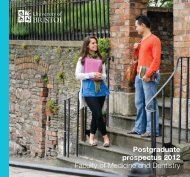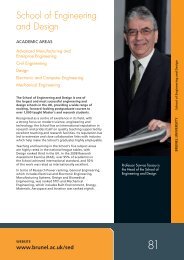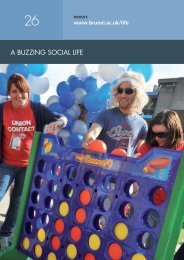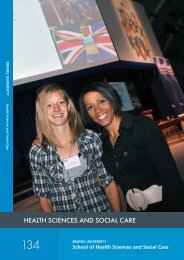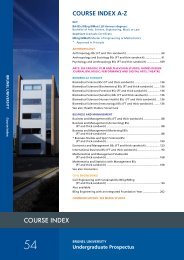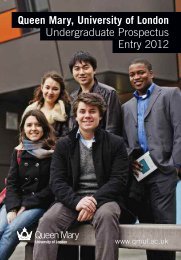BIOSCIENCESThe diverse habitats available around Swansea set itapart as a site for study and research in biology. Thesehabitats are located on the nearby Gower Peninsula (asite of Special Scientific Interest, and the UK’s first Areaof Outstanding Natural Beauty), in the Swansea Valleyand further afield in the Brecon Be<strong>ac</strong>ons National Parkand Pembrokeshire.Research in biosciences at Swansea, hosted by the Department ofBiosciences, is of relevance to a wide range of fields of studyfrom molecular and cellular through to whole organisms <strong>ac</strong>rossterrestrial and aquatic ecosystems.The Department welcomes proposals for postgraduate researchprojects that complement staff research interests.Research degrees in Biosciences will:• provide you with new and specialised research skills• prepare you for a career in <strong>ac</strong>ademic research and te<strong>ac</strong>hing• equip you with skills relevant for a rewarding career in fieldorientedand/or laboratory-oriented employment, includingeducation, conservation, environmental monitoring,and agriculture.Research StrengthsStaff research interests encompass ecology, marine biologyand aqu<strong>ac</strong>ulture.Ecological ResearchResearch work includes:• Algal Biotechnology• Animal Ecology and Conservation Ecology• Animal Smart Tag Research• Aquatic Predator-Prey Inter<strong>ac</strong>tions• Behavioural and Evolutionary Ecology of Fish, Aqu<strong>ac</strong>ulture andFisheries• Biocontrol• Environmental Imp<strong>ac</strong>t of Marine Renewable Energy• Habitat Restoration, Artificial Wetland and Nature ReserveDesign and Construction• Marine Turtles, Zooplankton, Jellyfish• Molecular Ecology and Evolution• Natural Products• Pathobiology and Aqu<strong>ac</strong>ulture• Plankton• Modelling.Equipment and f<strong>ac</strong>ilities include a stableisotope (13C and 15N) and CNelemental analyser, scintillation counters,GC and LC, particle and nutrientanalysers, oxygen and specific ionelectrodes, atomic adsorption and atomicemission spectrometers, digital imageanalysis systems, f<strong>ac</strong>ilities for recombinantDNA technology, and biological massspectrometry with <strong>ac</strong>cess to state-of-the-artproteomics f<strong>ac</strong>ilities.Culture and holding f<strong>ac</strong>ilities include afreshwater research unit, marine aquaria,environmentally controlled and constanttemperature growth rooms, andglasshouses. Laboratories are available forraising fungal biocontrol agents andmonoclonal antibodies.A 12.5m research vessel, smaller inshoreboats and a wide range ofoceanographic and biological measuringand sampling equipment are available forinshore work.The Centre for Sustainable AquaticResearch and the Freshwater ResearchUnit provide additional excellentresearch f<strong>ac</strong>ilities.One-year MSc by Research programmesare also available in the followingspecialist areas:• Aquatics• Biomathematics• Environmental Conservation• Environmental Sustainability• Mathematical Ecology• Migration Science• Sustainable Resources.“It is really enjoyable for me to work on my own subject andfeel part of group of experts. We also inter<strong>ac</strong>t with other researchgroups as all the domains are complementary either in terms ofknowledge or equipment and f<strong>ac</strong>ilities. This collaborative spirit isa great strength of research groups working at Swansea University.”Sylvie Vandenabeele, PhD Biological Sciences2425RESEARCH DEGREES – BIOSCIENCESResearch opportunitiesMSc by Research, MPhil, PhD, MRes(see page 80)RAE2008 75% of Swansea’s researchin Biological Science was judged tobe of international quality, 20% ofwhich was regarded as internationallyexcellent (3*)ProfessorsT ButtK FlynnG HaysA RowleyR WilsonEntry requirementsAn upper second-class or higher degree in a biological subject is normally required.English Language requirement:IELTS 6.5 (with a minimum of 5.5 in e<strong>ac</strong>h component) or Swansea Universityrecognised equivalent.Scholarships and BursariesA range of postgraduate scholarships and bursaries is available.For details, please visit:<strong>www</strong>.<strong>swansea</strong>.<strong>ac</strong>.<strong>uk</strong>/scholarships/<strong>Postgraduate</strong>Recent research has also been supported by the followingorganisations:• Biotechnology and Biological Sciences Research Council• Carbon Trust• Countryside Council for Wales• DEFRA• DFID• Environment Agency• European Union• Leverhulme Trust• Natural Environment Research CouncilFurther informationWebsite: <strong>www</strong>.<strong>swansea</strong>.<strong>ac</strong>.<strong>uk</strong>/biosciCont<strong>ac</strong>t the Marketing Officer:Email: s.kramcha@<strong>swansea</strong>.<strong>ac</strong>.<strong>uk</strong>Tel: +44 (0)1792 295333Visit the University: see page 182 for detailsApplications can be made online at:<strong>www</strong>.<strong>swansea</strong>.<strong>ac</strong>.<strong>uk</strong>/applyonline –see pages 184 – 185 for further informationFor details of Master’s courses available inBiosciences please see page 80.RESEARCH DEGREES – BIOSCIENCESAcademic and research staff 23<strong>Postgraduate</strong>s 36
BUSINESS MANAGEMENTManagement is about making decisions and getting themost from people at all levels in all types of organisations.It is interdisciplinary: social, environmental,psychological, economic, and technical f<strong>ac</strong>tors playimportant roles. The School of Business and Economicswelcomes proposals for postgraduate research projectsthat complement staff research interests.Research degrees in Business Management will:• provide you with new and specialised research skills• prepare you for a career in <strong>ac</strong>ademic research and te<strong>ac</strong>hing• equip you with skills relevant for a rewarding managementcareer in sectors such as retail, manuf<strong>ac</strong>turing, finance,<strong>ac</strong>counting, and the public sector.Research StrengthsStaff research interests cover the core disciplines ofBusiness Management:• E-business• Entrepreneurship• Finance• Human Resources• Information Systems• Marketing• Organisations and Work• Risk Management• Technology and Innovation Management.The School has extensive PC and multi-user computer f<strong>ac</strong>ilities,with networked PCs linked to a variety of server platforms. Allnetworked PCs have <strong>ac</strong>cess to a broad selection of resourcessuch as The Financial Times, The Economist and ABI/INFORM,and students have terminal <strong>ac</strong>cess to the Datastream financialinformation system. <strong>Postgraduate</strong> students have <strong>ac</strong>cess tocomputer labs and study areas at any time of the day.The School has a number of established research groupings,which provide focus and support its ongoing researchprogrammes and culture. Further details on research groups canbe found at: <strong>www</strong>.<strong>swansea</strong>.<strong>ac</strong>.<strong>uk</strong>/sbe/research/resgroup.phpHuman Resources, Organisations and EntrepreneurshipThe research <strong>ac</strong>tivity of this group includes cross-cultural researchon change management pr<strong>ac</strong>tices in multinational companies;industrial relations and models of partnership management;organisational design and behaviour; and research on the driversof entrepreneurship <strong>ac</strong>tivity. The group also carries outinterdisciplinary work in environmental management.Finance and Risk ManagementResearch in the finance area has a strong empirical basis. Areasof current interest include the modelling of futures and optionsdata, asset pricing models, insurance industry structure, the creditrating of insurers, and financial markets in developing economies.This research has been supported by national organisations suchas the Association of British Insurers, and internationalorganisations such as the Handelsbanken-Wallander Foundationand the Swedish Central Bank.Information Systems and e-businessThe marketing group undertakes theoreticaland applied research in marketingresearch methodology (particularly in crossculturalresearch, personal selling and salesmanagement), consumer behaviour, buyersellerrelationships, Internet marketing andmarketing communications. Research isalso conducted within the School ontourism demand modelling. In addition tothese research groupings, f<strong>ac</strong>ulty membersof the School are <strong>ac</strong>tively engaged inresearch in the areas of Entrepreneurship,Environment management, Tourism,Operations research and Statistics.MarketingThe marketing group undertakes theoreticaland applied research in marketing researchmethodology (particularly in cross-culturalresearch, personal selling and salesmanagement), consumer behaviour, buyersellerrelationships, Internet marketing andmarketing communications. Research is alsoconducted within the School on tourismdemand modelling. In addition to theseresearch groupings, f<strong>ac</strong>ulty members of theSchool are <strong>ac</strong>tively engaged in research inthe areas of Entrepreneurship, Environmentmanagement, Tourism, Operations researchand Statistics.People, Organisations and WorkThe People, Organisations and Work group isan internationally <strong>ac</strong>claimed team ofresearchers collectively interested in the humandynamics and relationships at play in organisedwork contexts. Multidisciplinary in nature, thegroup draws inspiration from <strong>ac</strong>ross the socialsciences and humanities (sociology, politics,psychology, gender studies and philosophy) inorder to contribute to the disciplinarymanagement areas of organisation studies,critical management studies, human resourcemanagement, international business,organisational psychology and industrialrelations. The group engages in qualitative,quantitative and post-structuralist researchtraditions, with particular areas of interest beingEthics and Politics in Organisations, Genderand Diversity at Work, Human Resources andInternational Management, Individuals and theCollective, and The Management andOrganisation of Health.Technology and Innovation ManagementThe work of the Technology and InnovationManagement Group is focused upon the keyrole played in modern society by ICT as a toolfor economic, business, and societaldevelopment. It also incorporates the Centre fore-Business Research (CeBR) which <strong>ac</strong>ts as afocal point for inter-group collaboration ontechnology-related business research such as e-marketing and e-banking. Research of nationaland international significance is conducted inthe areas of electronic government andelectronic democr<strong>ac</strong>y, technology adoptionand diffusion, information systems evaluation,electronic commerce/electronic business in theSME sector, and simulation for supply chainmanagement and resource planning/allocation within the healthcare context.As well as providing focus and direction forresearch, the research groups hold regularcolloquia and workshops designed topromote interdisciplinary research projects,and to provide impetus for research grantapplications and consultancy <strong>ac</strong>tivity.The School has current externally-fundedresearch projects on the information society(National Assembly for Wales), on businesssuccession planning (European Social Fund), onenvironmental management and on the labourmarket in Wales (European Social Fund).26RESEARCH DEGREES – BUSINESS MANAGEMENTResearch opportunitiesMPhil, PhDRAE2008 40% of research rated worldleading(4*) or internationally excellent (3*)ProfessorsE BischoffY DebrahD KnightsA PalmerA PullenC RhodesA SimintirasD ThomasM WilliamsAcademic and research staff 50Entry requirementsNormally a first or upper second-class Honours degree in a relevant subject.Scholarships and BursariesThe School and the University awards a limited number of researchstudentships (MPhil/PhD). For details, please visit<strong>www</strong>.<strong>swansea</strong>.<strong>ac</strong>.<strong>uk</strong>/scholarships/<strong>Postgraduate</strong>English Language requirement:IELTS 6.5 (minimum of 6.0 in e<strong>ac</strong>h component) or Swansea Universityrecognised equivalent.“My research focused on parameter estimation offinite mixture distributions and hidden Markovprocesses. I had two supervisors and I met with themonce a week to discuss the progress of my work. I amreally grateful that I had the opportunity to learn fromsuch brilliant minds.”Jen Ning Tan, PhD Business StudiesFurther informationWebsite: <strong>www</strong>.<strong>swansea</strong>.<strong>ac</strong>.<strong>uk</strong>/businessCont<strong>ac</strong>t the Marketing Officer: Dr A WatkinsEmail: a.watkins@<strong>swansea</strong>.<strong>ac</strong>.<strong>uk</strong>Tel: +44 (0)1792 295601Visit the University: see page 182 for detailsApplications can be made online at:<strong>www</strong>.<strong>swansea</strong>.<strong>ac</strong>.<strong>uk</strong>/applyonline– see pages 184 – 185 for further informationFor details of the Master’s degrees available inBusiness Management, please see page 82.27RESEARCH DEGREES – BUSINESS MANAGEMENT<strong>Postgraduate</strong>s 453


